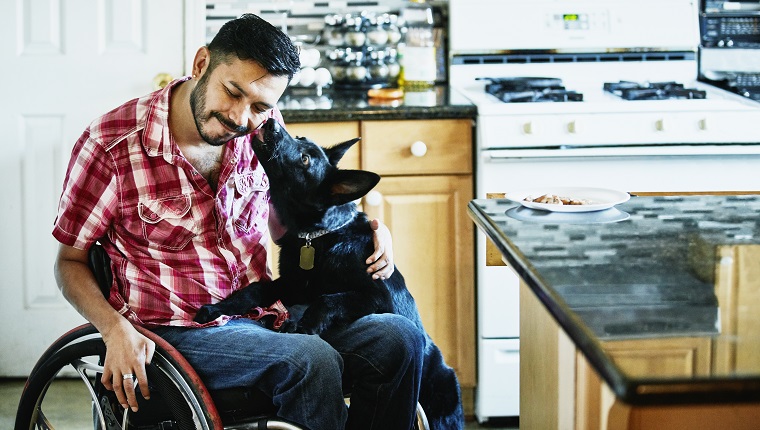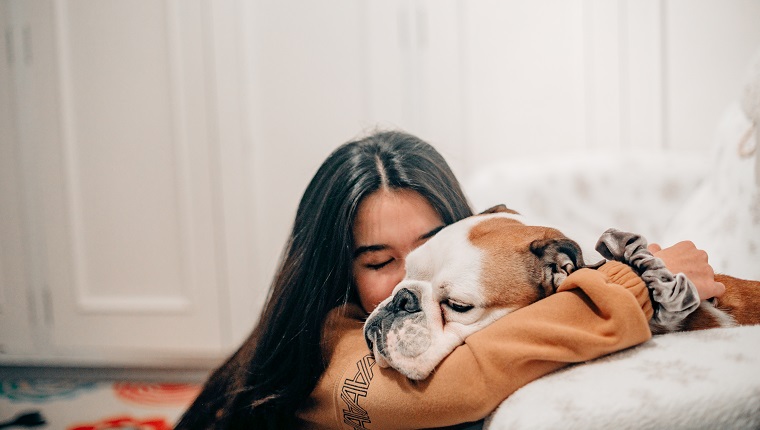Dogs are famous for making people smile. But for people who have depression or anxiety, could they be the cutest type of medicine?
First of all, if you believe you might have depression or anxiety, please see a doctor to discuss therapy, treatment, and other options. If you’re a person who likes animals, your doctor may indeed agree that a dog could help your situation.
According to a survey by Human-Animal Bond Research Institute, 74 percent of pet parents cited improved mental health after adding an animal into their homes. Regardless of your condition, dogs can brighten almost anyone’s mood. Here are just some of the mood-boosting effects a dog could have on your life.
Unconditional Love
One of the best parts about our relationship with dogs is their unconditional love. We don’t have to filter ourselves with dogs the way we do with other humans; they love and accept us as we are.
While dogs are brilliant creatures, they have simple emotions we often label as “pure” — you don’t have to worry about social hierarchies, political schemes, or other ill intentions. The worst cunning you have to worry about with a dog is a potential desire to nab a tempting morsel of food off of the counter–not exactly a back-stabbing move.
Even when my dog is “bad,” I can’t help but melt over how cute she is. I know, parenting at its best.
This means we can expose our insecurities, our heartbreaks, and our frustrations to our dogs, and not only will they still love us, but they will help those feelings go away.
It’s a simple equation with dogs: treat them well, give them food, shelter, and affection, and they will pay you back in love a thousand-fold.
Disrupting The Bad Feelings

Speaking of how smart dogs are, they are also wonderful at picking up on emotions. For example, dogs can be trained to disrupt the start of a seizure or a panic attack. But even without training, they seem to know when they’re needed.
Interacting with dogs is scientifically proven to improve health. Studies show dogs can lower humans’ blood pressure and heart rate, while raising serotonin and dopamine — chemicals in the brain that help us feel good. Hugs and touch with loved ones, furry or otherwise, produces oxytocin and reduces cortisol.
Not to mention, it’s so fun to watch dogs interact with the world around them. They have a great sense of humor and can make you laugh at the most unexpected times. It’s a lot harder to feel upset while watching a dog chase a rainbow reflection on the floor.
Live In The Moment
It can be hard to live in the moment these days, with the double-edged sword of technology and communication at our fingertips. When our minds race with multitasking worries or stress, it can cause anxiety.
On the other hand (paw?), it is truly beautiful to watch a dog enjoy a sunny afternoon in the grass. They’re not worried about a big report coming due at work or if they annoyed someone last week. They’re merely drinking in the sights, smells, sounds, and feelings of the moment.
Dogs live in the “now,” not worried about complicated “what-ifs” or past missteps, and their focused Zen is contagious. That kind of mindfulness is inspiring and something we humans could definitely learn from our dogs. I wonder if I could sign up for a dog-inar!
Saving A Life Feels Wonderful

If you’ve ever struggled to find purpose or meaning in your life, you can become an instant superhero by saving a life when you adopt a shelter dog. Actually, you save two lives: the dog you bring home and the dog you make room for at that shelter.
Truly, nothing could ever beat the feeling of saving a life, and adopted animals will forever show you their gratitude. “My rescue dog saved me,” many proud pet parents say in conversations, on social media posts, and on bumper stickers.
No matter what goes wrong in your life, you can take pride and solace in knowing you changed a dog’s whole world for the better.
Taking Care Of Someone Other Than Yourself
To go along with that sense of purpose, pets have been shown to give people even in deep bouts of depression a sense of routine, responsibility, and importance. According to research, these feelings improve mental health.
For someone struggling to get out of bed, it helps to have puppy-dog eyes looking up at you entreatingly, encouraging you to do something for them.
It takes the focus off of one’s own feelings of poor self-worth, and it removes what can become a question of doing things for oneself, knowing you can provide instant relief and happiness for another creature who depends on you.
Dogs Help People Socialize

Dogs help people of all ages to socialize. The practice of having children read to shelter dogs is growing in popularity, benefitting budding readers by boosting their confidence in front of an unconditionally appreciative audience, as well as dogs who may not be getting enough interaction with humans.
Dogs also help people, children and adults alike, to make connections with others. It’s easy to start a conversation by complimenting someone’s dog or asking questions about them.
Many dogs also don’t feel the same intimidation about walking up to someone new that we might. Personally, I’ve made many friends through dog rescues and their fundraising events; people who go out of their way to help animals are often the best types of people, I’ve found!
Interacting with a dog eases a person’s sense of loneliness, too. Even if dogs aren’t speaking the same language as us — though, sometimes they do — they speak the universal language of love and companionship.
Dogs can help us to practice our social skills, too, even if we don’t know they’re doing it. Knowing how to make requests of another, knowing how to comfort someone, and making observations about the world are all things dogs can and usually do help us with.
Taking The Next Step
If you think a dog could brighten your life, please consider visiting a rescue in-person or online. DogTime’s adoption page is a great resource to show adoptable animals in your area across many rescues, and you can even narrow your search parameters by breed and other factors.
Again, please be sure to talk to your doctor if you’re experiencing depression or anxiety, as a dog can be just one of several helpful components to improving mental health.
Do you think dogs can help people who suffer from depression or anxiety? How has your dog helped improve your mental health? Let us know in the comments below!








